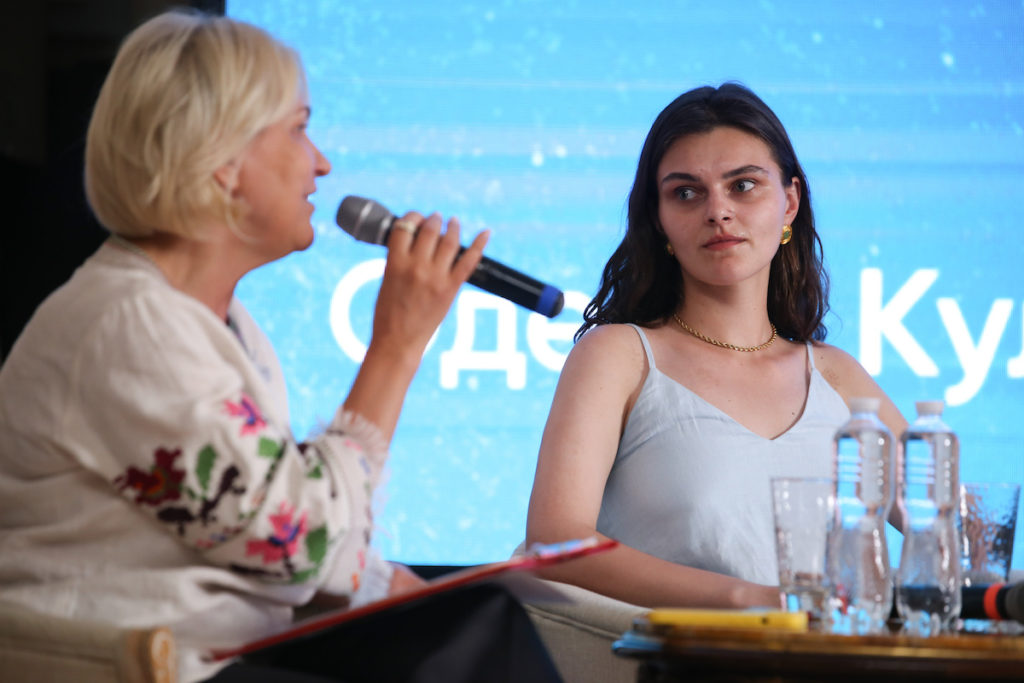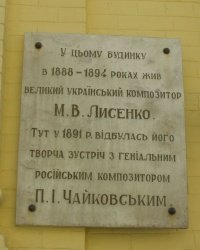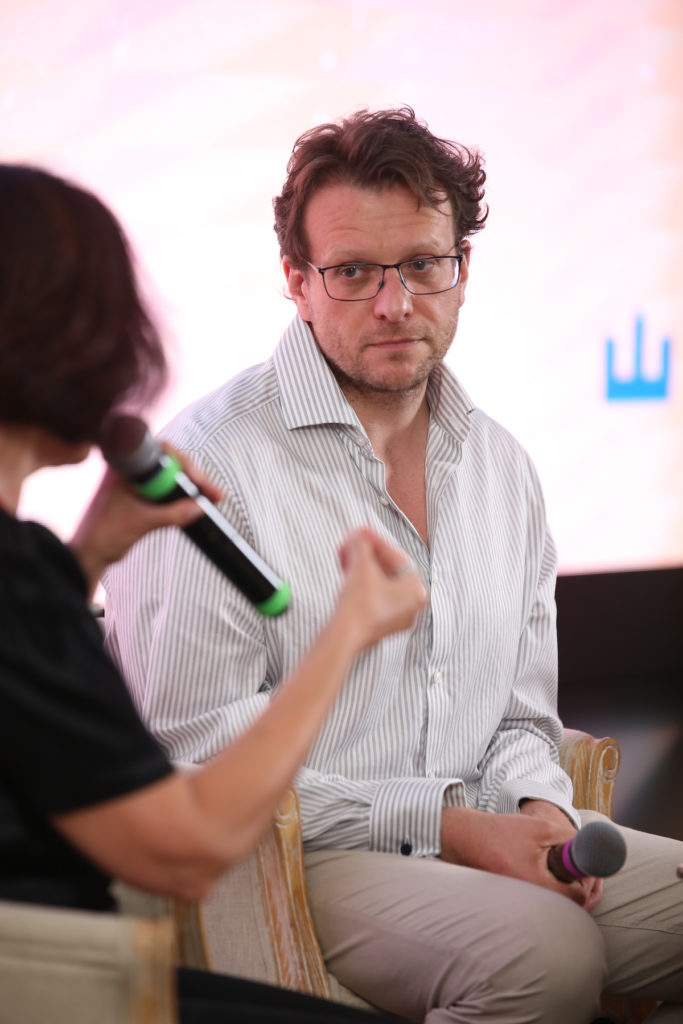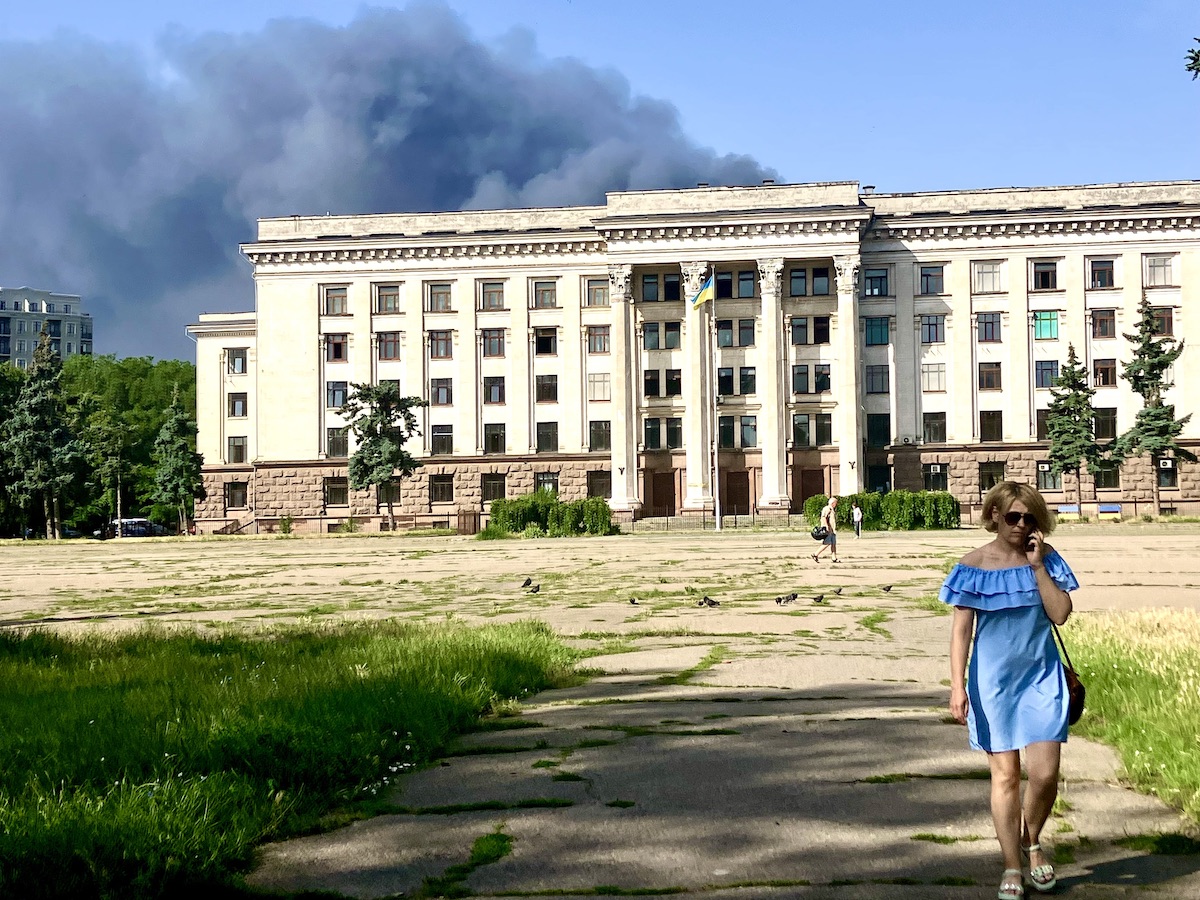On a hot sunny afternoon, about fifty business owners, museum and theater directors, scholars, activists, journalists, and concerned residents of Odesa gathered in the Windsor Grand Ballroom of the posh Bristol Hotel to discuss the role of culture in the process of decolonization. In a basement ballroom qualified as a bomb shelter, women in summer dresses and men in t-shirts and shorts snacked on exquisite blackcurrant delicacies, drank cappuccinos, and chatted about post-colonial process in Ukraine.
Bristol, a pink and luscious Baroque Revival affair that happens to be the finest hotel in town, runs its own powerful generator so the blackout did not interfere with the event.
The Odesa Decolonization project, run by the Odesa Business Club and funded by USAID Ukraine (UCBI: Strengthening Public Trust in Ukraine), fits into the national trend.
In 2023, the Law On Condemnation and Prohibition of Propaganda of Russian Imperial Policy in Ukraine and Decolonization of Toponymy was adopted and decolonization became an important subject for both the community and government. As of 27 April 2024, two Odesa districts, 210 streets, ten alleys, squares, and monuments were renamed amidst heated discussions.
The very street where the conference took place is currently between names: Pushkinska (after the Russian poet Alexander Pushkin) and its initial name Italianska (honoring the Italian architects that gave the city its distinctively Mediterranean look and feel in the 19th century), offered a symbolic commentary on the subject of discussion. The session held on 21 June 2024, and dedicated to culture in particular, brought together entrepreneurs and cultural figures.
Maria Galina, a journalist, poet, and art critic, wrote, “It is very important… that perhaps for the first time in a hundred years, business in this cultural development project goes side by side with artists and cultural figures.”

Moderator Zoya Kazanzhi, a well-known Odesa journalist and writer, began the conversation by presenting two opposing views.
- One popular opinion is that during the war, resources should focus solely on the army and victory. The war is not the time for culture.
- The other view argues that culture is integral to national identity and the very thing the army is fighting to preserve. Erasing Ukrainian culture, history, and language can be perceived as genocide, and Ukrainians are fighting the war for identity as much as for territory. In addition, art and culture, some claim, are vital tools in the information war.
All participants eagerly supported the latter view. Guest speakers from Kharkiv, Lviv, and participants from Odesa confirmed a rising interest in Ukrainian culture during the Russian full-scale invasion.
Yuliia Pyvovarova, director of the Odesa Academic Music and Drama Theater, noted that the Konotop Witch show at Franko Drama Theater in Kyiv, staged after a fiction story by Ukrainian writer Hryhorii Kvitka-Osnovianenko, has been sold out for months, with all proceeds going to the army. The same show also opened in Odesa and sold out quickly. The military on leave are frequent guests at these performances.
Imperial history shaped individual and collective mentality, so simply canceling it is not an option.
Tetiana Pylypchuk, director of the Kharkiv Literary Museum

Tetiana Pylypchuk, director of the Kharkiv Literary Museum, noted that since 2022, many in Odesa and Kharkiv had to choose their identity.
Due to the imperial past, the Ukrainian identity was dissolved and people identified with the Russian Empire or the Soviet Union. Imperial history shaped individual and collective mentality, so simply canceling it is not an option.
Decolonization requires a national and local culture to become part of personal history and identity. Awareness and treatment of imperial trauma are paramount in this time-consuming and difficult psychological process.
Russia was always presented and therefore perceived as central and exceptional, with other countries in the post-Soviet space being peripheral. Attitudes and behaviors must gradually change, shedding the notion of Ukrainian culture being provincial or inferior to the “great Russian culture.”
According to Kostyantin Doroshenko, a Ukrainian art critic, author, a podcast host, “Tsarist Russia attempted to create a tradition of the succession of the Holstein-Gottorp-Romanov dynasty from Kyivan Rus. Soviet ideology adopted this dynastic version of history. The doctrine ‘Three peoples — Three brothers’ labeled Russian, Belarusian, and Ukrainian peoples as ‘brotherly’ and recognized the supremacy of the Russian people. The Belarusian and Ukrainian peoples were considered ‘Russians with local deviations.’”
Other nationalities faced a similar fate: in Lviv, Jewish tragic history was virtually unknown during the USSR era.
The consequences lingered in independent Ukraine: journalist Sofia Cheliak, program director of BookForum, born after 1991 in Western Ukraine, was unable to study journalism in Kyiv because she didn't speak Russian.
Yet, it is hard to overestimate the role of the government: the process involves practical steps, such as changing the educational curriculum, promoting Ukrainian language and literature, and ensuring that cultural policies support the national identity. The speakers discussed the financing, state support, and the need to invest in artists and cultural institutions.
On a global scale, changes are necessary as well.
Until 1991, Ukraine was part of the Russian cultural sphere, and Ukrainian art, music, and literature were overshadowed by Russian. Cultural appropriation is one of the tactics widely used by both the Russian Empire and the USSR.
“Ukrainian and Russian histories differ dramatically. The Moscow state tradition was formed by its proximity to the Golden Horde, while the Ukrainian state tradition was influenced by the Galician Principality, the Grand Duchy of Lithuania, and the Commonwealth. By the time Bohdan Khmelnytsky unified Ukrainian lands with Muscovy, Ukraine was already a part of European civilization, intellectually and socially. Ukrainian folk tradition and culture have remained different from the Russian for centuries,” commented Kostyantin Doroshenko at the beginning of the full-scale invasion.
Peter Pomerantsev, a Soviet-born British journalist, author, and TV producer, emphasized the importance of "reputational security." He argued that countries and cities must consider how their reputation affects their security. Writers and artists act as diplomats, representing Ukrainian voices and influencing decision-makers in partner countries, said Olesya Ostrovska-Lyuta, director of the Art Arsenal.
Decolonization requires dismantling the very hierarchical structures imposed by former empires.
Olesia Ostrovska-Liuta, director of the Art Arsenal
Iryna Biryukova, general director of the 195-year-old Odesa National Scientific Library, suggested looking at culture as infrastructure. During past wars, archive documents were preserved for the future, with museum staff risking their lives to protect this heritage. Russians recognize this importance, stealing art and heritage from many museums, Kherson being a notable example. Ukrainian society funds culture through taxes, enabling museums to preserve artifacts and history.
Decolonization involves more than reclaiming cultural objects and taking down monuments.
Olesia Ostrovska-Liuta, director of the Art Arsenal, emphasized that decolonization is a nuanced process that involves individuals recognizing and rejecting the myths propagated by the former empire. It requires dismantling the very hierarchical structures imposed by former empires.
Former colonies often inherit the hegemon's culture, creating a complex identity crisis. Hierarchy persists even after an empire falls. Detachment from the imperial legacy is crucial but complex and takes time, according to Pomerantsev. This cognitive shift involves rebirth and rethinking national narratives.
Culture offers a shared space for such narratives. During the war, it becomes a co-thinking virtual hub to process war experiences. Finding others with similar stories is not just therapeutic, it helps form collective memories and shape identity via common grief, fears, and desires. Writers who became soldiers gave voice to the army, contributing to Ukraine's story and self-exploration.
Ukraine's battle is for culture and identity. Rethinking history amid Russian aggression involves a complete break from the Russian imperial and Soviet past. Russia has weaponized culture, a tradition since Soviet times.
The Kremlin now pushes the concept of the "Russian world," aiming to force Ukrainians into it. This involves forceful integration of occupied territories, information warfare, and cultural manipulation. Ukrainian culture becomes both a battlefield and a weapon in this existential fight for survival. The fate of Ukrainian culture hinges on the war's outcome, Ostrovska-Liuta said.
One could add that the war's outcome also depends on the existence of Ukrainian culture.
Rethinking history amid Russian aggression involves a complete break from the Russian imperial and Soviet past.
Olesia Ostrovska-Liuta, director of the Art Arsenal
Peter Pomerantsev: the Kremlin’s subversion tactics and Ukraine's strategic communication success
In the second part of the discussion, Peter Pomerantsev, a leading expert on Kremlin propaganda, explained that Russia has been preparing for a potential invasion since the Orange Revolution of 2004 by creating narratives designed to soften resistance in Ukraine.
Russian strategies aimed to make locals feel valued and ensure a welcoming attitude to Russian invaders. This tactic is part of a broader theory of information war. Lengthy preparation periods, known in the UK as Phase Zero operations, lay the psychological groundwork for physical invasions.

Russian cultural and media institutions, operating under the guidance of policymakers, military, and security forces, utilized and continue to create films, television programs, compatriot groups, and cultural institutions to prepare the society for invasion.
In 2014, Russia attempted to provoke civil conflict in Ukraine and, specifically, in Odesa. Local activists countered the Kremlin propaganda by analyzing Odesans’ core desires and fears, focusing on common interests rather than divisions. They emphasized the threat of destruction, leveraging fears of Odesa’s chances of being ruined similar to the war-torn cities in Donbas. This approach effectively countered Kremlin propaganda by addressing the population's fundamental fears and aspirations.
Pomerantsev also introduced the concept of reputational security, where countries and cities must consider their reputation in terms of security, not just image.
For Odesa, highlighting its importance to the world due to the grain corridors in the Black Sea and its historical heritage can enhance its security. He draws a parallel to 1939-40 Britain, which needed to convince the US to supply arms to fend off a German invasion. Britain’s effort focused on portraying itself as determined and aligned with American values of freedom.
This historical example is relevant to Ukraine’s present need for strategic communication in defending national security.
Overall, Ukraine has successfully gained support from both right-wing nationalists and liberals in Europe and the West. It appeals to nationalists for its fight for sovereignty and to liberals for its democratic values. Ukraine's progress in spreading its message since 2014 stands as a significant communication success story.
Related:
- “Decolonization will not be stopped”: Ukraine expands movement against Russian cultural imperialism
- “Do Svidaniya” to Russo-centrism: Western schools start decolonizing Eastern Europe studies
- Ukraine adopts law that condemns Russian Imperial policy and decolonizes toponyms
- Pushkin monuments disappear from Ukrainian streets following Lenin, as decolonization is underway
- Odesa waits to join UNESCO list while grappling with monument to Russian Empress Catherine II

